- Home
- FPMT Homepage
Foundation for the Preservation of the Mahayana Tradition
The FPMT is an organization devoted to preserving and spreading Mahayana Buddhism worldwide by creating opportunities to listen, reflect, meditate, practice and actualize the unmistaken teachings of the Buddha and based on that experience spreading the Dharma to sentient beings. We provide integrated education through which people’s minds and hearts can be transformed into their highest potential for the benefit of others, inspired by an attitude of universal responsibility and service. We are committed to creating harmonious environments and helping all beings develop their full potential of infinite wisdom and compassion. Our organization is based on the Buddhist tradition of Lama Tsongkhapa of Tibet as taught to us by our founders Lama Thubten Yeshe and Lama Thubten Zopa Rinpoche.
- Willkommen
Die Stiftung zur Erhaltung der Mahayana Tradition (FPMT) ist eine Organisation, die sich weltweit für die Erhaltung und Verbreitung des Mahayana-Buddhismus einsetzt, indem sie Möglichkeiten schafft, den makellosen Lehren des Buddha zuzuhören, über sie zur reflektieren und zu meditieren und auf der Grundlage dieser Erfahrung das Dharma unter den Lebewesen zu verbreiten.
Wir bieten integrierte Schulungswege an, durch denen der Geist und das Herz der Menschen in ihr höchstes Potential verwandelt werden zum Wohl der anderen – inspiriert durch eine Haltung der universellen Verantwortung und dem Wunsch zu dienen. Wir haben uns verpflichtet, harmonische Umgebungen zu schaffen und allen Wesen zu helfen, ihr volles Potenzial unendlicher Weisheit und grenzenlosen Mitgefühls zu verwirklichen.
Unsere Organisation basiert auf der buddhistischen Tradition von Lama Tsongkhapa von Tibet, so wie sie uns von unseren Gründern Lama Thubten Yeshe und Lama Thubten Zopa Rinpoche gelehrt wird.
- Bienvenidos
La Fundación para la preservación de la tradición Mahayana (FPMT) es una organización que se dedica a preservar y difundir el budismo Mahayana en todo el mundo, creando oportunidades para escuchar, reflexionar, meditar, practicar y actualizar las enseñanzas inconfundibles de Buda y en base a esa experiencia difundir el Dharma a los seres.
Proporcionamos una educación integrada a través de la cual las mentes y los corazones de las personas se pueden transformar en su mayor potencial para el beneficio de los demás, inspirados por una actitud de responsabilidad y servicio universales. Estamos comprometidos a crear ambientes armoniosos y ayudar a todos los seres a desarrollar todo su potencial de infinita sabiduría y compasión.
Nuestra organización se basa en la tradición budista de Lama Tsongkhapa del Tíbet como nos lo enseñaron nuestros fundadores Lama Thubten Yeshe y Lama Zopa Rinpoche.
A continuación puede ver una lista de los centros y sus páginas web en su lengua preferida.
- Bienvenue
L’organisation de la FPMT a pour vocation la préservation et la diffusion du bouddhisme du mahayana dans le monde entier. Elle offre l’opportunité d’écouter, de réfléchir, de méditer, de pratiquer et de réaliser les enseignements excellents du Bouddha, pour ensuite transmettre le Dharma à tous les êtres. Nous proposons une formation intégrée grâce à laquelle le cœur et l’esprit de chacun peuvent accomplir leur potentiel le plus élevé pour le bien d’autrui, inspirés par le sens du service et une responsabilité universelle. Nous nous engageons à créer un environnement harmonieux et à aider tous les êtres à épanouir leur potentiel illimité de compassion et de sagesse. Notre organisation s’appuie sur la tradition guéloukpa de Lama Tsongkhapa du Tibet, telle qu’elle a été enseignée par nos fondateurs Lama Thoubtèn Yéshé et Lama Zopa Rinpoché.
Visitez le site de notre Editions Mahayana pour les traductions, conseils et nouvelles du Bureau international en français.
Voici une liste de centres et de leurs sites dans votre langue préférée
- Benvenuto
L’FPMT è un organizzazione il cui scopo è preservare e diffondere il Buddhismo Mahayana nel mondo, creando occasioni di ascolto, riflessione, meditazione e pratica dei perfetti insegnamenti del Buddha, al fine di attualizzare e diffondere il Dharma fra tutti gli esseri senzienti.
Offriamo un’educazione integrata, che può trasformare la mente e i cuori delle persone nel loro massimo potenziale, per il beneficio di tutti gli esseri, ispirati da un’attitudine di responsabilità universale e di servizio.
Il nostro obiettivo è quello di creare contesti armoniosi e aiutare tutti gli esseri a sviluppare in modo completo le proprie potenzialità di infinita saggezza e compassione.
La nostra organizzazione si basa sulla tradizione buddhista di Lama Tsongkhapa del Tibet, così come ci è stata insegnata dai nostri fondatori Lama Thubten Yeshe e Lama Zopa Rinpoche.
Di seguito potete trovare un elenco dei centri e dei loro siti nella lingua da voi prescelta.
- 欢迎 / 歡迎
简体中文
“护持大乘法脉基金会”( 英文简称:FPMT。全名:Foundation for the Preservation of the Mahayana Tradition) 是一个致力于护持和弘扬大乘佛法的国际佛教组织。我们提供听闻,思维,禅修,修行和实证佛陀无误教法的机会,以便让一切众生都能够享受佛法的指引和滋润。
我们全力创造和谐融洽的环境, 为人们提供解行并重的完整佛法教育,以便启发内在的环宇悲心及责任心,并开发内心所蕴藏的巨大潜能 — 无限的智慧与悲心 — 以便利益和服务一切有情。
FPMT的创办人是图腾耶喜喇嘛和喇嘛梭巴仁波切。我们所修习的是由两位上师所教导的,西藏喀巴大师的佛法传承。
繁體中文
護持大乘法脈基金會”( 英文簡稱:FPMT。全名:Found
ation for the Preservation of the Mahayana Tradition ) 是一個致力於護持和弘揚大乘佛法的國際佛教組織。我們提供聽聞, 思維,禪修,修行和實證佛陀無誤教法的機會,以便讓一切眾生都能 夠享受佛法的指引和滋潤。 我們全力創造和諧融洽的環境,
為人們提供解行並重的完整佛法教育,以便啟發內在的環宇悲心及責 任心,並開發內心所蘊藏的巨大潛能 — 無限的智慧與悲心 – – 以便利益和服務一切有情。 FPMT的創辦人是圖騰耶喜喇嘛和喇嘛梭巴仁波切。
我們所修習的是由兩位上師所教導的,西藏喀巴大師的佛法傳承。 察看道场信息:
- FPMT Homepage
- News/Media
-
- Study & Practice
-
-
- About FPMT Education Services
- Latest News
- Programs
- New to Buddhism?
- Buddhist Mind Science: Activating Your Potential
- Heart Advice for Death and Dying
- Discovering Buddhism
- Living in the Path
- Exploring Buddhism
- FPMT Basic Program
- FPMT Masters Program
- FPMT In-Depth Meditation Training
- Maitripa College
- Lotsawa Rinchen Zangpo Translator Program
- Universal Education for Compassion & Wisdom
- Online Learning Center
-
- Prayers & Practice Materials
- Overview of Prayers & Practices
- Full Catalogue of Prayers & Practice Materials
- Explore Popular Topics
- Benefiting Animals
- Chenrezig Resources
- Death & Dying Resources
- Lama Chopa (Guru Puja)
- Lama Zopa Rinpoche: Compendium of Precious Instructions
- Lama Zopa Rinpoche: Life Practice Advice
- Lama Zopa Rinpoche Practice Series
- Lamrim Resources
- Mantras
- Prayer Book Updates
- Purification Practices
- Sutras
- Thought Transformation (Lojong)
- Audio Materials
- Dharma Dates - Tibetan Calendar
- Translation Services
- Publishing Services
- Ways to Offer Support
- Prayers & Practice Materials
-
- Teachings and Advice
- Find Teachings and Advice
- Lama Zopa Rinpoche Advice Page
- Lama Zopa Rinpoche: Compendium of Precious Instructions
- Lama Zopa Rinpoche Video Teachings
- ༧སྐྱབས་རྗེ་བཟོད་པ་རིན་པོ་ཆེ་མཆོག་ནས་སྩལ་བའི་བཀའ་སློབ་བརྙན་འཕྲིན།
- Podcasts
- Lama Yeshe Wisdom Archive
- Buddhism FAQ
- Dharma for Young People
- Resources on Holy Objects
- Teachings and Advice
-
-
*If a menu item has a submenu clicking once will expand the menu clicking twice will open the page.
-
-
- Centers
-
- Teachers
-
- Projects
-
-
-
-
*If a menu item has a submenu clicking once will expand the menu clicking twice will open the page.
-
-
- FPMT
-
-
-
-
-
We are not compelled to meditate by some outside agent, by other people, or by God. Rather, just as we are responsible for our own suffering, so are we solely responsible for our own cure. We have created the situation in which we find ourselves, and it is up to us to create the circumstances for our release. Therefore, as suffering permeates our life, we have to do something in addition to our regular daily routine. This “something” is spiritual practice or, in other words, meditation.
The Purpose of Meditation
Lama Yeshe Wisdom ArchiveShare
Lama Zopa Rinpoche
-
-
-
- Shop
-
-
-
The Foundation Store is FPMT’s online shop and features a vast selection of Buddhist study and practice materials written or recommended by our lineage gurus. These items include homestudy programs, prayers and practices in PDF or eBook format, materials for children, and other resources to support practitioners.
Items displayed in the shop are made available for Dharma practice and educational purposes, and never for the purpose of profiting from their sale. Please read FPMT Foundation Store Policy Regarding Dharma Items for more information.
-
-
19
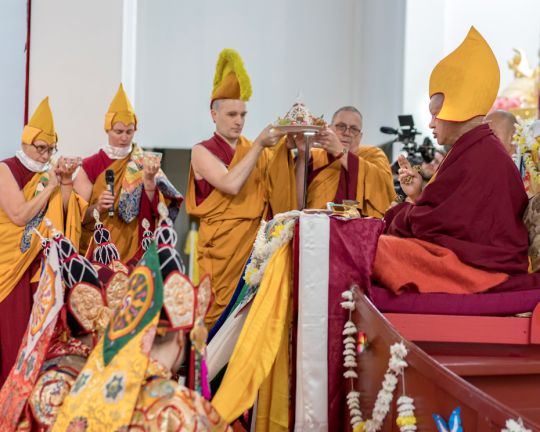
Offering tsog during long life puja for Lama Zopa Rinpoche, Great Stupa of Universal Compassion, Australia, May 2018. Photo by Ven. Lobsang Sherab.
The six-week long Bodhicaryavatara (A Guide to the Bodhisattva’s Way of Life) and Rinjung Gyatsa Retreat at the Great Stupa of Universal Compassion in Bendigo, Australia, came to a conclusion on Saturday, May 12. Ven. Holly Ansett, executive assistant to FPMT CEO Ven. Roger Kunsang, and long-time Australian student Owen Cole shared their reports on the retreat:
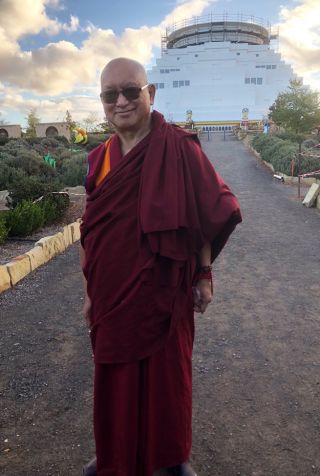
Lama Zopa Rinpoche at the Great Stupa of Universal Compassion, Bendigo, Australia, May 2018. Photo by Ven. Roger Kunsang.
Throughout the six-week Bodhicaryavatara and Rinjung Gyatsa Retreat with Lama Zopa Rinpoche, participants commented to each other that something special was going on, that this retreat was unique, profound, and very precious. In other words, all the conditions had come together for deep and transforming practice.
One long-time student speaking about the retreat told Owen Cole that “the ground shifted.”
“By that they meant that even though many of the long-time students who attended the retreat had heard the information conveyed in the teachings before, this time the message penetrated deeper,” Owen wrote.
Rinpoche himself remarked at the end of the retreat that everything went well and had been extremely harmonious and peaceful.
One of the reasons for this, Rinpoche said, was that all the retreat participants did Lama Chöpa Jorcho practice for several hours every morning exactly the way that Rinpoche had instructed.
Earlier in the retreat, Rinpoche had said there was no rush in doing the practice. So for six weeks, participants, led by the beautiful voice of Ven. Thubten Dechen, chanted the tunes—slowly, melodically, and mostly in Tibetan—just as Rinpoche had indicated.
Doing it this way, Rinpoche said, “softened the mind” and created the beneficial conditions.
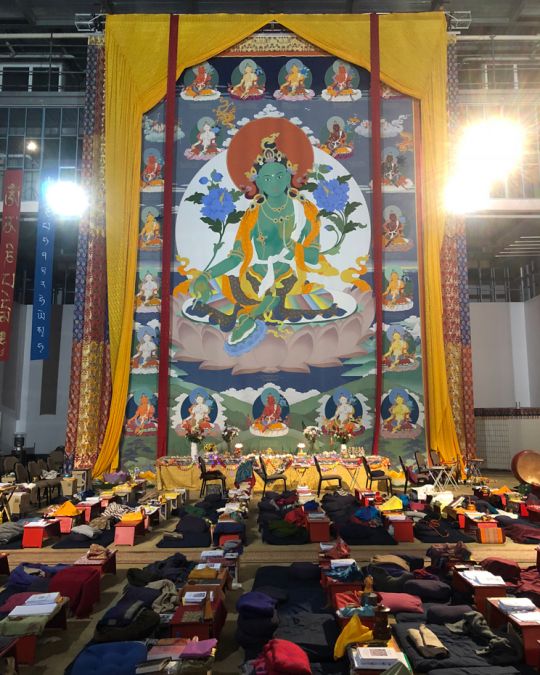
A giant Tara thangka painted by Peter Iseli hung in The Great Stupa during the retreat. One day Rinpoche taught on the importance of very large thangkas, Australia, May 2018. Photo by Ven. Roger Kunsang.
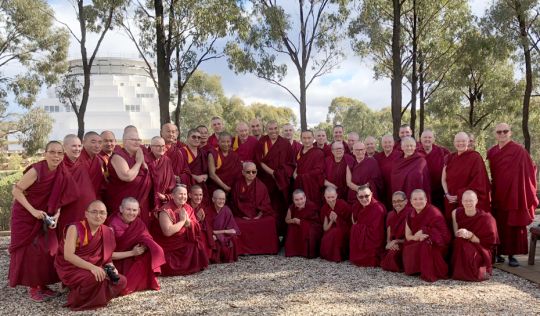
Lama Zopa Rinpoche and Sangha pose for a group photo after a lunch in the Stupa Cafe offered by Rinpoche to Sangha, Great Stupa of Universal Compassion, Australia, May 2018. Photo by Ven. Roger Kunsang.
During the last two weeks of the retreat, Rinpoche gave a Heruka initiation over several days. Rinpoche also gave five initiations from the Rinjung Gyatsa set of 305 initiations and a Lama Tsongkhapa long life initiation for Ven. Thubten Gyatso, a senior student and director of the nearby Thubten Shedrup Ling Monastery.
Rinpoche gave an unprecedented number of teachings during the retreat, all of which were streamed live online and are now available to watch as streaming video.
Rinpoche’s experiential teachings covered lamrim topics, emphasizing correctly following the guru in thought and action, and bodhichitta.
Rinpoche’s concluding teaching for the retreat, on May 11, was on the Twelve Links of Dependent Origination—a teaching he had received from Geshe Sopa Rinpoche—and the meaning of the popular Wheel of Life image.
After the concluding teaching, a deeply felt thank you mandala was offered to Rinpoche.
Ven. Gyatso and Ian Green, director of The Great Stupa of Universal Compassion, spoke on behalf of the Heart of Wisdom board, which was the body responsible for organizing the retreat. They acknowledged the contributions and hard work of their fellow board members, including Ruby Karmay, director of Atisha Centre, which is located adjacent to The Great Stupa.
Ven. Tenzin Tsapel, who coordinated the spiritual program for the retreat following all of Rinpoche’s wishes, was also thanked. The retreat coordinator, Ven. Losang Dorje, was praised for the excellent work he did organizing all of the details and offered a round of applause. Ian gave a brief summary report of the retreat’s expenses.
Ven. Dorje then thanked all the volunteer teams—gompa, office, and grounds and maintenance— that allowed retreat participants to focus on practice without worry of other things. The transcription work of Ven. Joan Nicell and the work of the live interpreters were also acknowledged. In addition many, many others not named here were thanked.
At one point during the retreat, Rinpoche commented to Ven. Roger Kunsang that these teachings on Bodhicaryavatara and the Rinjung Gyatsa initiations are extremely important for the FPMT organization.
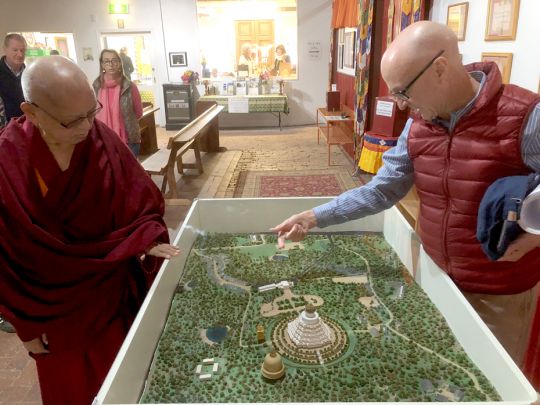
Lama Zopa Rinpoche and Ian Green looking at a model of the master plan for The Great Stupa of Universal Compassion and grounds. Rinpoche and Ian met many times during the retreat to discuss sacred art for the stupa and future development. Photo by Ven. Roger Kunsang.
During the afternoon of May 11, a large Saint Francis of Assisi statue was unveiled in the Peace Park on the grounds of The Great Stupa. Rinpoche and the Catholic Bishop of Sandhurst, Bishop Leslie Rogers Tomlinson, blessed the statue.
Meanwhile retreat participants cleaned and decorated the gompa inside The Great Stupa in preparation for the following day’s long life puja for Rinpoche.
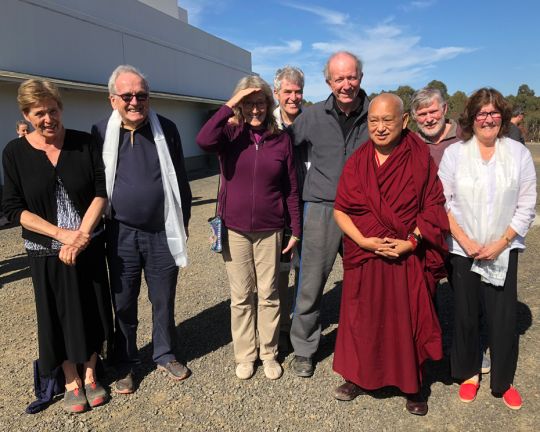
Students in the fourth week of the Bendigo Retreat who attended the 1978 November Kopan Course forty years ago. Owen Cole wrote, “In those days, many of us slept on the ground in a tent and had to take a bucket down to the local freezing Nepali spring in winter to bathe, but the Kopan courses in those days were an exhilarating experience for us all as they have been for the thousands who have attended them since.” From left, Gun Cisse (Sweden), Geoff Pullen (UK), Vicki Taylor (Sydney), Murray Wright (New Zealand), Owen Cole (Hayagriva), Kyabje Lama Zopa Rinpoche, Greg Carr (Hayagriva), Margaret Bohler (Sydney). Absent Ven. Thubten Gyatso. Photo by Ven. Roger Kunsang.
The retreat was attended by a cross section of FPMT students, traveling from near and far, including more than sixty-five ordained Sangha.
“Ninety students did the whole six-week retreat with almost four hundred taking part for at least part of it. There was an average of about 160 students in any week with about one-third of those from outside Australia,” Owen Cole wrote.
“Organizing the retreat involved creating a small village from nothing by setting up sixty accommodation tents as well as caravans, portable toilets and showers, a marquee (tent) dining hall, and a portable kitchen. Electricity for the kitchen came from a portable generator and with the number of people and lack of infrastructure, drinking water even had to be trucked into the site and sewage trucked out.
“The karma yoga with participants having to cooperate and get to know each other through jobs such as maintaining the altar, serving food, dish washing, cleaning toilets and showers, and ground maintenance also built a sense of community. Without this huge input of volunteer labor the retreat could not have happened.”
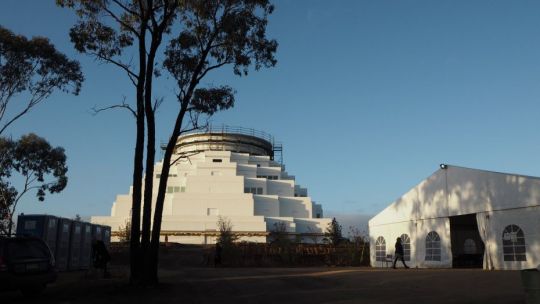
The Great Stupa and marquee, Australia, May 2018. Photo by Ven. Tenzin Tsultrim.
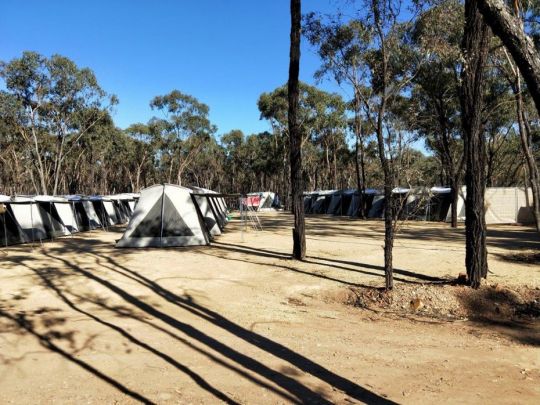
Tents set up for retreat participants at The Great Stupa of Universal Compassion, Australia, May 2018. Photo by Owen Cole.
The Long Life Puja
More than four hundred people attended the long life puja for Lama Zopa Rinpoche on Saturday, May 12, at The Great Stupa of Universal Compassion.
Resident geshes from FPMT Australia centers were there, including Geshe Thubten Rapten (Thubten Shedrup Ling), Geshe Phuntsok Tsultrim (Chenrezig Institute), Geshe Ngawang Samten (Vajrayana Institute), Geshe Lobsang Doga (Tara Institue), and Geshe Ngawang Sonam (Hayagriva Centre). Geshe Jampa Tharchin, resident geshe at Chandrakirti Centre in New Zealand, was also there, as well as Geshe Tenzin Zopa, an FPMT touring geshe who attended the entire retreat.
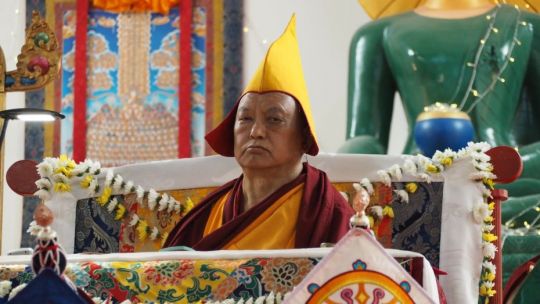
Lama Zopa Rinpoche during the long life puja for him, The Great Stupa of Universal Compassion, Australia, May 12, 2018. Photo by Ven. Tenzin Tsultrim.
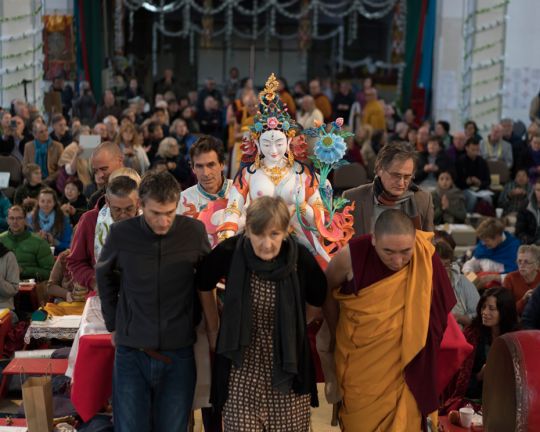
Students carrying in the White Tara statue offered to Rinpoche during the long life puja, The Great Stupa of Universal Compassion, Australia, May 2018. Photo by Ven. Lobsang Sherab.
Rinpoche entered the carefully arranged gompa to gracefully falling white flower petals.
During the puja, which lasted six hours, Rinpoche was offered a White Tara statue, sculpted by Bertrand Cayla over a period of a year and painted by Sonam Sherpa and Bertrand over a period of several months at Nalanda Monastery in France. The life-sized statute was shipped to Bendigo and filled by Geshe Thubten Rapten and Ven. Gyatso.
Vens. Thubten Dechen and Gyalten Wangmo offered the long life prayer to Rinpoche composed by Rangjung Neljorma Khadro Namsel Drönme (Khadro-la), masterfully sung to a Bhutanese tune. As they sang, it seemed as if sunlight illuminated the statue, creating an auspicious and touching moment.
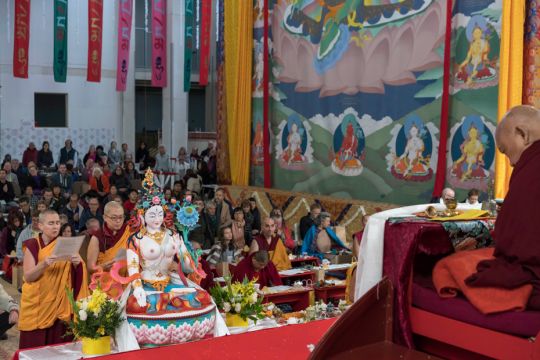
Vens. Dechen and Gyalten offer long life prayer by Khadro-la to Lama Zopa Rinpoche, The Great Stupa of Universal Compassion, Australia, May 2018. Photo by Ven. Lobsang Sherab.
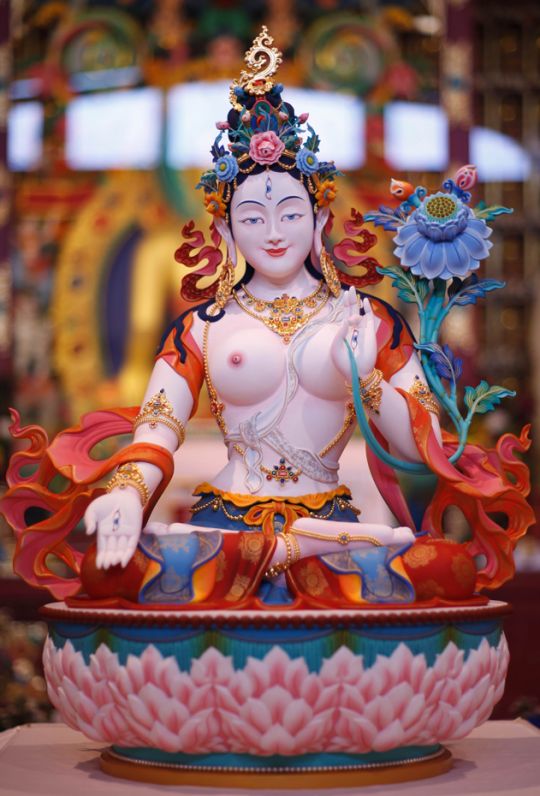
White Tara statue in France before being sent to Australia to be offered to Rinpoche. Photo by Bertrand Cayla.
Student strongly participated in the long life puja, singing from their hearts and receiving the blessings from Rinpoche.
After the puja, Rinpoche invited seventy-five people to lunch in a Nepali restaurant in Bendigo. Rinpoche offered the lunch as a way of showing appreciation to the people who have taken on important responsibilities at FPMT centers, including resident geshes and teachers, directors, spiritual program coordinators, board members, and so forth. It was a happy and relaxed time at the restaurant.
The next day before leaving Thubten Shedrup Ling, where he stayed during the retreat, Rinpoche led an incense puja in the garden of the monastery. Rinpoche traveled next to Adelaide, where he blesses Buddha House’s new building on May 20.
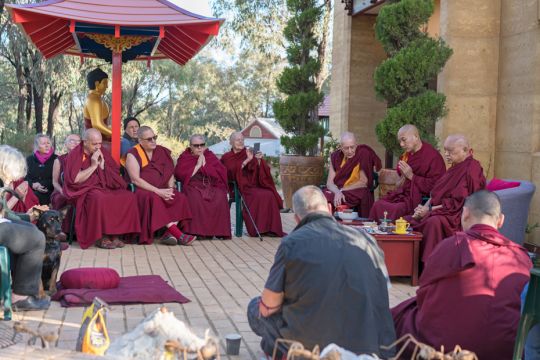
Lama Zopa Rinpoche doing incense puja at Thubten Shedrup Ling, Australia, May 2018. Photo by Ven. Lobsang Sherab.
“It was an incredible and moving retreat,” Ven. Holly said. “It was not like anything else I’ve experienced. It was such a precious time. The conditions of prayers and effort came together for a retreat of a life time.”
Watch Lama Zopa Rinpoche’s teachings from the Bodhicaryavatara and Rinjung Gyatsa Retreat in Australia:
https://fpmt.org/media/streaming/teachings-of-lama-zopa-rinpoche/lama-zopa-rinpoche-teachings-in-bendigo-2018/
Lama Zopa Rinpoche is the spiritual director of the Foundation for the Preservation of Mahayana Tradition (FPMT), a Tibetan Buddhist organization dedicated to the transmission of the Mahayana Buddhist tradition and values worldwide through teaching, meditation, and community service.
- Home
- News/Media
- Study & Practice
- About FPMT Education Services
- Latest News
- Programs
- New to Buddhism?
- Buddhist Mind Science: Activating Your Potential
- Heart Advice for Death and Dying
- Discovering Buddhism
- Living in the Path
- Exploring Buddhism
- FPMT Basic Program
- FPMT Masters Program
- FPMT In-Depth Meditation Training
- Maitripa College
- Lotsawa Rinchen Zangpo Translator Program
- Universal Education for Compassion & Wisdom
- Online Learning Center
- Prayers & Practice Materials
- Overview of Prayers & Practices
- Full Catalogue of Prayers & Practice Materials
- Explore Popular Topics
- Benefiting Animals
- Chenrezig Resources
- Death & Dying Resources
- Lama Chopa (Guru Puja)
- Lama Zopa Rinpoche: Compendium of Precious Instructions
- Lama Zopa Rinpoche: Life Practice Advice
- Lama Zopa Rinpoche Practice Series
- Lamrim Resources
- Mantras
- Prayer Book Updates
- Purification Practices
- Sutras
- Thought Transformation (Lojong)
- Audio Materials
- Dharma Dates – Tibetan Calendar
- Translation Services
- Publishing Services
- Teachings and Advice
- Find Teachings and Advice
- Lama Zopa Rinpoche Advice Page
- Lama Zopa Rinpoche: Compendium of Precious Instructions
- Lama Zopa Rinpoche Video Teachings
- ༧སྐྱབས་རྗེ་བཟོད་པ་རིན་པོ་ཆེ་མཆོག་ནས་སྩལ་བའི་བཀའ་སློབ་བརྙན་འཕྲིན།
- Podcasts
- Lama Yeshe Wisdom Archive
- Buddhism FAQ
- Dharma for Young People
- Resources on Holy Objects
- Ways to Offer Support
- Centers
- Teachers
- Projects
- Charitable Projects
- Make a Donation
- Applying for Grants
- News about Projects
- Other Projects within FPMT
- Support International Office
- Projects Photo Galleries
- Give Where Most Needed
- FPMT
- Shop
Translate*
*powered by Google TranslateTranslation of pages on fpmt.org is performed by Google Translate, a third party service which FPMT has no control over. The service provides automated computer translations that are only an approximation of the websites' original content. The translations should not be considered exact and only used as a rough guide.Proper guru devotion – correct devotion to your virtuous friends – allows you to actualize successfully all the steps of the path to enlightenment, from the perfect human rebirth up to buddhahood itself.








